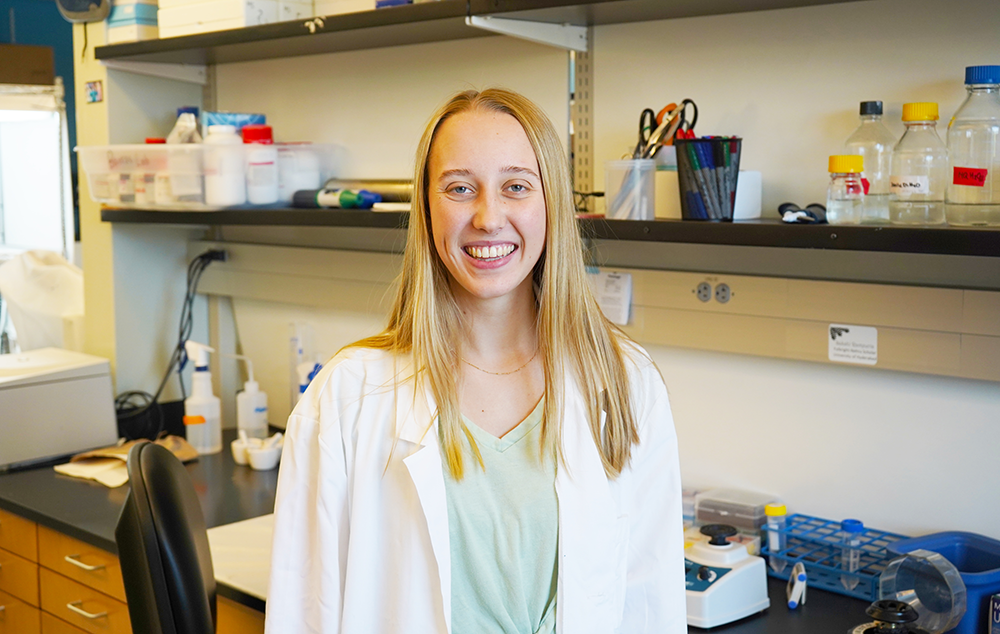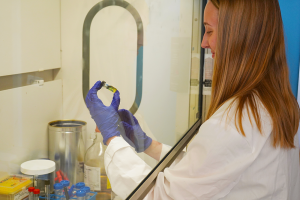
The Freshman Research in Plants (FRIPS) Program paves the way for first-year students at the University of Missouri to connect with the exciting plant-related research taking place across campus. For Rachel Weber, the program opened the door for her to explore her own research interests.
Weber grew up in Columbia, and attended Hickman High School. She chose Mizzou because she knew there would be numerous research experiences for her to pursue.
“I knew Mizzou had plenty of research opportunities, which is a big reason why I chose to come here,” Weber said. “I was fortunate enough to learn more about those opportunities through FRIPS, and there was definitely a spark when I was able to finally get into the laboratory.”
The FRIPS Program, which is overseen by the MU Office of Undergraduate Research, connected Weber with Jaime Barros-Rios, an assistant professor in the Division of Plant Science and Technology. The two have been working together for the past year.
While Weber is early in her collegiate journey, Barros-Rios is just getting started at Mizzou, too. Barros-Rios is about to celebrate a year at Mizzou as part of the PFF Postdoctoral Fellowship Program.
“Seeing the laboratory grow from the very beginning has been awesome and very unique,” said Weber, a biochemistry major who just finished her freshman year. “We’ve worked together to set up the lab, and it has been really interesting to watch the progression.”

Weber’s project is one of the first to be conducted in the Barros-Rios lab. She is focusing on lignin, a functional unit of the plant cell wall. Weber said lignin is very important for a plant’s growth and development – providing structure, helping respond to stress and facilitating water transport.
“If you don’t have lignin, a tree wouldn’t get very tall and strong, for example,” Weber said. “It’s a very complex polymer and there are three main subunits that make up the polymer of lignin. There are also two different types of enzymes that both work to combine these three subunits into lignin.”
Weber is looking specifically at those two enzymes, which are laccases and peroxidases. She is working to understand the differences between the enzymes, which is a bit difficult, as there are nearly 20 laccases and more than 60 peroxidases found in Arabidopsis thaliana.
To study the enzymes, Weber is planting mutants that have knockouts of select laccases and peroxidases that she wants to focus on. She is studying the phenotypes of the mutant plants and the resulting differences between the roles of the two enzymes in lignin biosynthesis.
“This project is more fundamental research in terms of understanding the biosynthesis of lignin,” Weber said. “Lignin is incredibly important, and the hope is that this work will have a bigger impact down the road.”
Weber’s research this summer will be funded, in part, through the Cherng Summer Scholars program. A full-time, nine-week summer research or creative scholarship program for Honors College students, the program is supported by a gift from Peggy and Andrew Cherng and the Panda Charitable Foundation. Recipients receive a $7,000 award and access to a $1,000 project expense account.
“It was crazy to be named a recipient,” Weber said. “I knew I was going to be here this summer and wanted to be in the lab as much as possible. This award is giving me the opportunity to be more independent with my work and really grow as a researcher. This funding allows me to work more hours and focus on my project.”
Weber said that her research is a great example of taking what she’s learning in the classroom and applying it to a hands-on scenario. She’s especially excited to work with plants as her grandparents actively farm, which spiked her interest in plants at an early age.
“Being in the lab is really a direct application of what I’m learning in the classroom,” Weber said. “It also allows me to study those biochemistry concepts in plants, which is the perfect mix for me. My first year at Mizzou really connected everything together, and I’m excited to build on what I’ve done. I’m ready to continue to this research journey.”